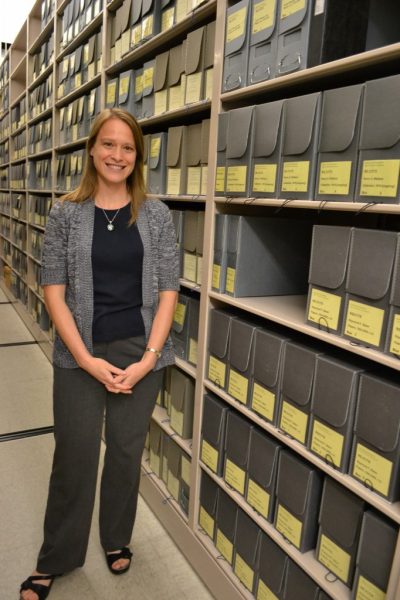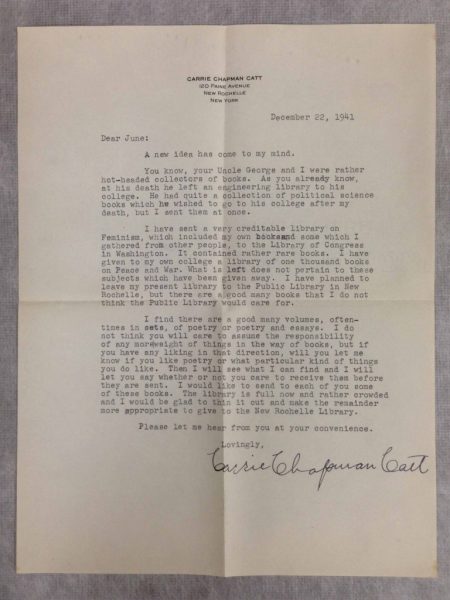The Catt Center recently helped facilitate the purchase of a collection of personal correspondence between Carrie Chapman Catt, her nieces and several family friends.
The letters, which date from the early to mid-1930s to the mid-1940s, were originally purchased at an estate sale by Joe and Tracy Conway of Clovis, Calif. The Conways were interested in the stamps on the envelopes, not the content. However, after discovering who authored the letters, the Conways contacted the Catt Center because of Catt’s association with Iowa State University. They hoped to sell the letters to an organization that could properly archive them.
“My wife and I understand the importance of ensuring that the personal letters of this great lady, her letterhead, her personalized envelopes and her handwritten signatures should be archived in the proper place,” Joe Conway said.

Laura Sullivan, collections archivist at Iowa State University’s Parks Library, stands in front of the Carrie Chapman Catt papers.
After the initial contact with the Conways, Sue Cloud, communications specialist at the center, consulted with Laura Sullivan, collections archivist at Iowa State’s Parks Library, about the library’s interest in the letters. After getting descriptions and photos of some of the letters, the library decided to move forward with the purchase.
The collection, which contains several hundred letters, is currently being processed and added to the Carrie Chapman Catt papers in the Special Collections department of Parks Library.
“The university archives holds a small collection of Carrie Chapman Catt’s papers, and these new letters will be a great addition,” Sullivan said.
The letters written by Catt are on her personal letterhead, contain her signature and include the envelopes in which they were mailed. Letters by Catt’s nieces, Ruhe Linn and Cora June Linn, include references to Catt regarding both general family interactions and historically significant events in which Catt was involved during that time period. In addition to helping document some of Catt’s world peace efforts, on which she focused after the ratification of the 19th Amendment to the U.S. Constitution granting women the right to vote, the correspondence reveals family members’ thoughts and activities during the events of the day and help illustrate Catt’s relationship with her family.
“Catt’s letters are mingled in with other correspondence between family and friends, and they are all a wonderful glimpse into the time period,” Sullivan said.
The letters mention the death of King George V of Great Britain; a coal mine explosion; roasting a turkey at a local bakery for Thanksgiving; frustrations with a new car; and reading a book by economist Hazel Zimmerman, who worked for the only investment house for women in the United States.

This letter from Catt to her niece Cora June Linn mentions a donation of books to Iowa Agricultural College (now Iowa State).
“Most of Catt’s other known correspondence focuses on her work in the U.S. suffrage movement,” said Dianne Bystrom, center director. “These letters, written by Catt and her family members and close friends, will provide insight into her less well-known personal side.”
The letters will be available for the Iowa State community and public to view in the special collections department’s reading room. In addition, the library will be digitizing a selection of the letters and adding them to its digital collections, which is available online.